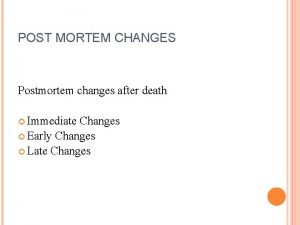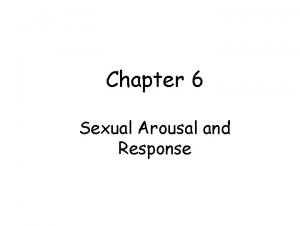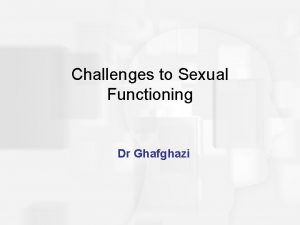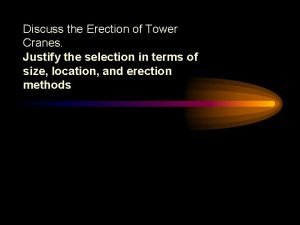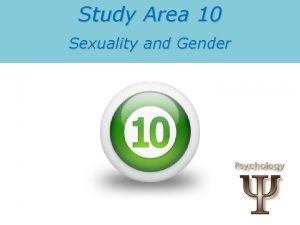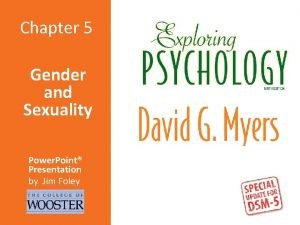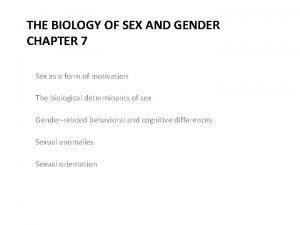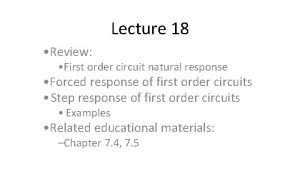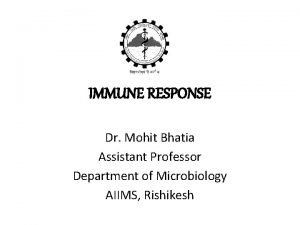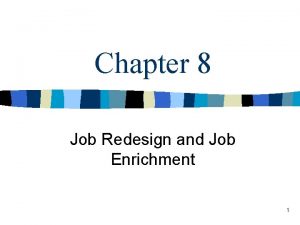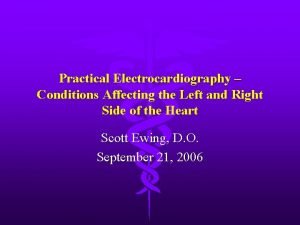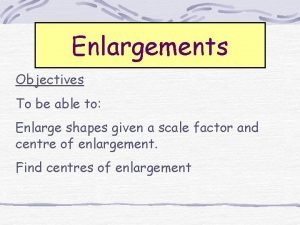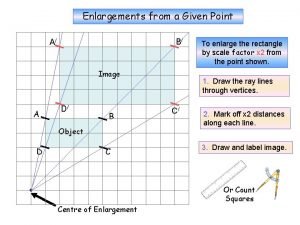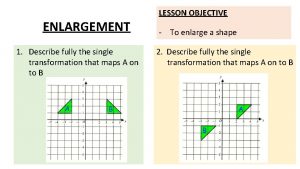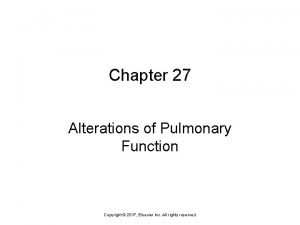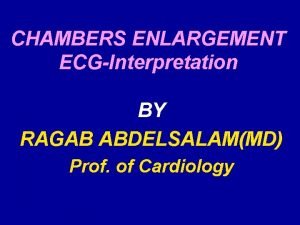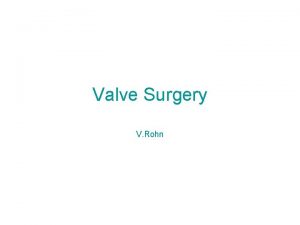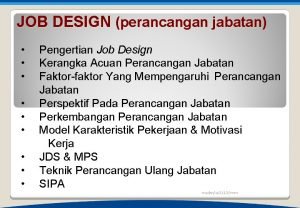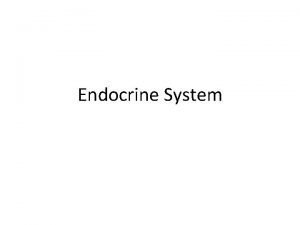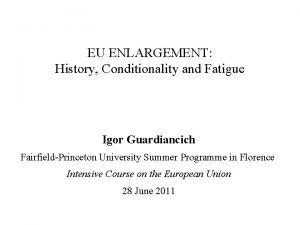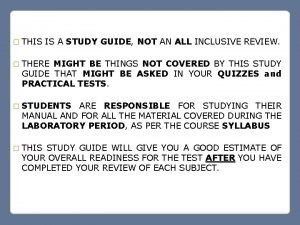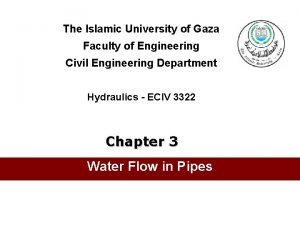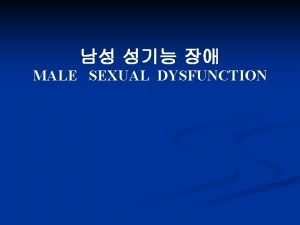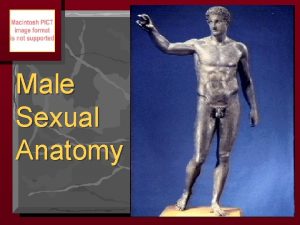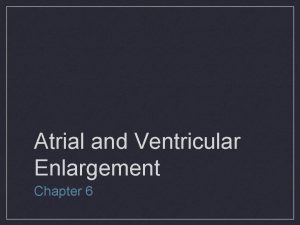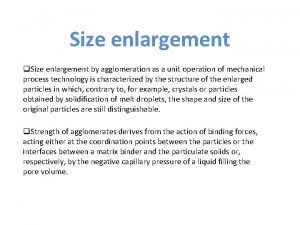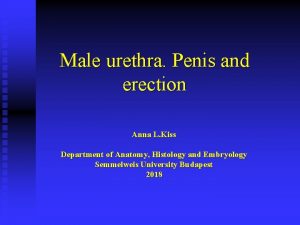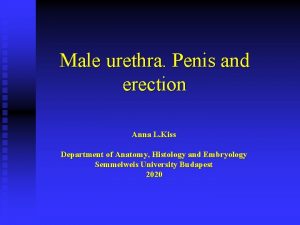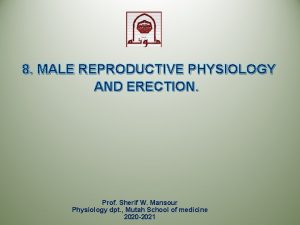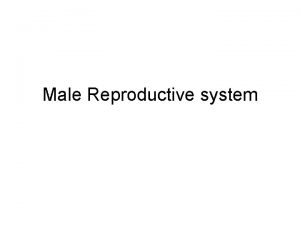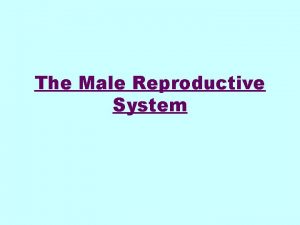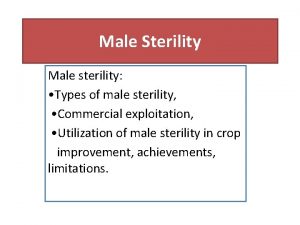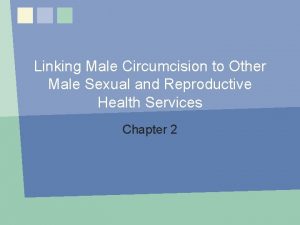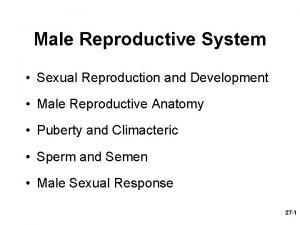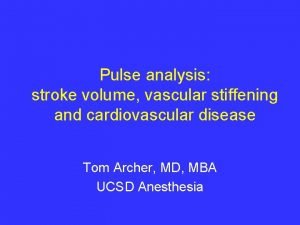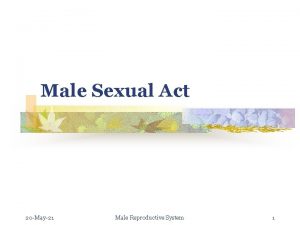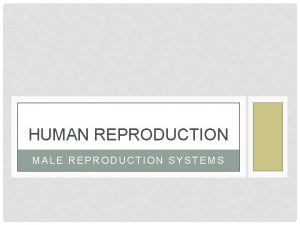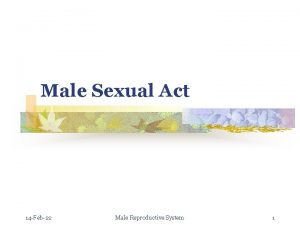Male Sexual Response Erection Enlargement and stiffening of































- Slides: 31

Male Sexual Response: Erection • Enlargement and stiffening of the penis from engorgement of _________________ with blood • During arousal, a __________________ promotes the release _ • Nitric oxide causes erectile tissue to fill with blood

Male Sexual Response: Erection • Expansion of the _ – ____________________ their drainage veins – _____________________ and maintains engorgement • The corpus spongiosum functions in ___________________ during ejaculation

Male Sexual Response • Erection is initiated by sexual stimuli including: – – Erotic sights, sounds, and smells • Erection can be ___________________ solely by emotional or _

Ejaculation • • The propulsion of semen from the male duct system At ejaculation, __________________ nerves cause: 1. Reproductive ducts and accessory organs to contract and _

Ejaculation • At ejaculation, sympathetic nerves cause: (continued) 2. _______________________________________, preventing the expulsion of urine 3. Bulbospongiosus muscles to undergo a rapid series of contractions 4.

Spermatogenesis • The sequence of events that produces sperm in the seminiferous tubules of the testes • Each cell has __________________ (one maternal, one paternal) and is said to be __________________ (2 n chromosomal number)

Spermatogenesis • Humans have 23 pairs of homologous chromosomes • ____________________ and are said to be _____________ (n chromosomal number) • Gamete formation is by ________________, in which the number of chromosomes is halved (from 2 n to n)

Figure 27. 8 b, c

Meiosis – Interphase • Two ________ divisions halve the number of chromosomes • Chromosomes _ Figure 27. 7. 1

Meiosis – Prophase I • Homologous chromosomes undergo _ • Tetrads are formed with _ • __________________ takes place during prophase I Figure 27. 7. 2. 1

Meiosis – Metaphase I • __________ at the spindle equator during_ Figure 27. 7. 2. 2

Meiosis – Anaphase I • Homologous chromosomes composed of ___________ are distributed to opposite ends of the cell Figure 27. 7. 2. 3

Meiosis – Telophase I • Nuclear membrane forms around chromosomal masses • • • With telophase and cytokinesis completed, two haploid daughter cells are formed (with 2 n amount of DNA) Figure 27. 7. 2. 4

Meiosis II • Mirrors mitosis except that chromosomes are not replicated before it begins • Meiosis accomplishes two tasks: – It ______________________ by half (2 n to n) – It introduces _

Brain-Testicular Axis • Hormonal regulation of sperm production and testicular hormones involving the – – –

Brain-Testicular Axis • Testicular regulation: three sets of hormones: • Gn. RH: – ___________________ stimulates the testes through: • Follicle stimulating hormone (FSH) • Luteinizing hormone (LH) • ____________________, which _________________ stimulate the testes • Testicular hormones – exert negative feedback controls

Hormonal Regulation • The hypothalamus releases gonadotropin-releasing hormone (Gn. RH) • Gn. RH stimulates the _____________________ to secrete FSH and LH – • causes _______________________ cells to release androgen-binding protein (ABP) – • stimulates ________________________ to release testosterone • ABP binding of testosterone enhances _

Hormonal Regulation • Feedback inhibition on the hypothalamus and pituitary results from: – Rising levels of _ – Increased _ Figure 27. 10

Testosterone Activity • Testosterone – Steroid hormone: synthesized from _ • It must be transformed to exert its effects on some target cells – Prostate • it is converted into dihydrotestosterone (____) before it can bind within the nucleus – Neurons • it is ______________________ to bring about stimulatory effects

Testosterone • Testosterone targets _ • its _________________ causes these organs to _

Male Secondary Sex Characteristics • Male hormones make their appearance at puberty and induce changes in _ – Appearance of _ – Enhanced growth of the chest and deepening of the voice – Skin thickens and becomes oily – ___________________ and increase in density – Skeletal muscles increase _

Male Secondary Sex Characteristics • Testosterone is the basis of _________________ in both males and females

Female Reproductive Anatomy • ________________: primary female reproductive organs – Make female gametes • – Secrete female sex hormones • • Accessory ducts include _

Female Reproductive Anatomy • Internal genitalia – • – external sex organs

Female Reproductive Anatomy Figure 27. 11

The Ovaries • _____________ organs on each side of the uterus held in place by several ligaments – – Suspensory – Mesovarium • – contains the suspensory ligament and the mesovarium

The Ovaries Figure 27. 14 a

Ovaries • Blood supply – ___________________ and the ovarian branch of _ • They are surrounded by a fibrous tunica albuginea, – covered by a layer of epithelial cells called the _ • Embedded in the _____________ are ovarian follicles

Ovaries • Each follicle consists of an _ • Cells around the oocyte are called: – • one cell layer thick – • when ___________________ is present

Ovaries • – one layer of squamous-like follicle cells surrounds the oocyte • – two or more layers of ______________________ cells enclose the oocyte • – has a _____________________ between granulosa cells that coalesces to form a central _

Ovaries • – secondary follicle at its ___________________ that bulges from the surface of the ovary • Ovulation – _____________________ from the ripening follicle • – ruptured follicle _
 Cadaveric spasm and rigor mortis difference
Cadaveric spasm and rigor mortis difference Define arouse sexually
Define arouse sexually How erection happens
How erection happens Erection hardness scale
Erection hardness scale Tower crane types
Tower crane types Primary sexual characteristics
Primary sexual characteristics Male secondary sexual characteristics
Male secondary sexual characteristics Arousal cycle
Arousal cycle Sexual response cycle psychology definition
Sexual response cycle psychology definition Phases of sexual response
Phases of sexual response Natural response and forced response
Natural response and forced response What is natural response
What is natural response A subsequent
A subsequent Job enrichment example
Job enrichment example Enlargement of a lymphoid organ in the luq
Enlargement of a lymphoid organ in the luq Lumbosacral enlargement
Lumbosacral enlargement Lvh criteria cornell
Lvh criteria cornell Job enrichment vs job enlargement
Job enrichment vs job enlargement How to enlarge a shape by scale factor 2
How to enlarge a shape by scale factor 2 Centre of enlargement
Centre of enlargement Describe fully transformation
Describe fully transformation Bulbous enlargement of the distal segments of the fingers
Bulbous enlargement of the distal segments of the fingers Left atrial enlargement ecg
Left atrial enlargement ecg Aortic root enlargement
Aortic root enlargement Pendekatan perancangan jabatan
Pendekatan perancangan jabatan Underactive thyroid symptoms
Underactive thyroid symptoms Enlargement drawing
Enlargement drawing Enlarge a shape by scale factor 2
Enlarge a shape by scale factor 2 Eu enlargement timeline
Eu enlargement timeline Tule river spillway enlargement project
Tule river spillway enlargement project Gray horn
Gray horn Chezy formula
Chezy formula
